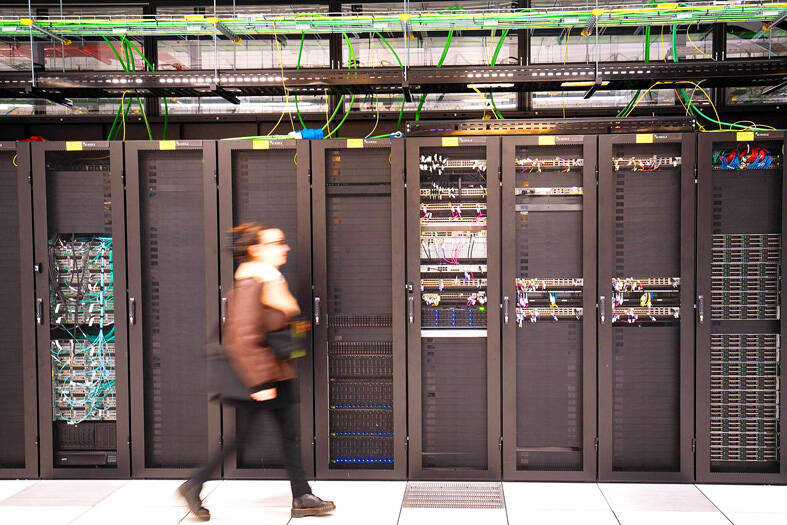Wiwynn Corp (緯穎), a supplier of artificial intelligence (AI) servers and components, yesterday said it more than tripled its capital expenditure for this year to NT$18 billion (US$548.2 million) in its latest efforts to expand its global manufacturing footprint amid a growing requirement to divert production away from Mexico due to tariff hikes by the US.
That compared with a budget of NT$5 billion last year. This year’s outlay primarily aims to fund the construction of a newly announced US$300 million factory in Texas and a new factory in Kaohsiung’s Lujhu District (路竹), which is under construction, as well as additional capacity expansions at existing plants in Mexico and Malaysia, Wiwynn chief financial officer Harry Chen (陳昌偉) told investors.
“We have to equip ourselves with countermeasures in response to the capricious [tariff] situation,” Chen said. “Any changes in US tariffs policy will not sway our decisions to build a US fab.”

Photo: Nathan Laine, Bloomberg
Wiwynn did not aim to make the Texas fab a substitute for its Mexican plants, but to offer an extra option for customers and greater flexibility in choosing manufacturing sites to help them address the tariffs issue, Chen said.
Some customers requested to stop delivering servers from Mexico entirely and to shift production to Wiwynn’s factories in the Czech Republic or Malaysia, while some customers chose to pay 25 percent tariffs and stick to their original production plans in Mexico, he said.
Mexico is a major server manufacturing hub for Wiwynn, making up about 70 percent of its total server capacity.
Wiwynn yesterday gave an upbeat business outlook, fueled by strong demand from the world’s major cloud service providers (CSP), which plan to expand capital expenditure by a double-digit percent this year versus last year. Wiwynn counts US-based CSPs Meta Platforms Inc and Microsoft Corp among its major clients.
On top of that, the company said it is scheduled to ship GB200-powered AI servers later this quarter as requested by its customers. That would mark the first time Wiwynn has tapped into the AI server market based on Nvidia Corp’s AI chips.
“We are bullish about customers’ demand in 2025 on the back of strong capital expenditure by CSPs,” Chen said. “Both AI servers and general-purpose servers are growing this year.”
With the takeoff of generative AI applications, servers have become an essential item for CSPs, Chen said.
None of them can afford risking operating under insufficient computing power and scant memory storage, he added.
“AI-related demand is sustaining. It is not just a short-lived [phenomenon],” Chen said.
Strong revenue last month reinforced the company’s positive view, he said.
Revenue last month surged 91.22 percent year-on-year to a new record high of NT$46.51 billion, he said.
That brought revenue in the first two months of this year to NT$84.02 billion, a spike of 95 percent from the same period last year.

TARIFFS: The global ‘panic atmosphere remains strong,’ and foreign investors have continued to sell their holdings since the start of the year, the Ministry of Finance said The government yesterday authorized the activation of its NT$500 billion (US$15.15 billion) National Stabilization Fund (NSF) to prop up the local stock market after two days of sharp falls in reaction to US President Donald Trump’s new import tariffs. The Ministry of Finance said in a statement after the market close that the steering committee of the fund had been given the go-ahead to intervene in the market to bolster Taiwanese shares in a time of crisis. The fund has been authorized to use its assets “to carry out market stabilization tasks as appropriate to maintain the stability of Taiwan’s

STEEP DECLINE: Yesterday’s drop was the third-steepest in its history, the steepest being Monday’s drop in the wake of the tariff announcement on Wednesday last week Taiwanese stocks continued their heavy sell-off yesterday, as concerns over US tariffs and unwinding of leveraged bets weighed on the market. The benchmark TAIEX plunged 1,068.19 points, or 5.79 percent, to 17,391.76, notching the biggest drop among Asian peers as it hit a 15-month low. The decline came even after the government on late Tuesday authorized the NT$500 billion (US$15.2 billion) National Stabilization Fund (國安基金) to step in to buoy the market amid investors’ worries over tariffs imposed by US President Donald Trump. Yesterday’s decline was the third-steepest in its history, trailing only the declines of 2,065.87 points on Monday and

TARIFF CONCERNS: The chipmaker cited global uncertainty from US tariffs and a weakening economic outlook, but said its Singapore expansion remains on track Vanguard International Semiconductor Corp (世界先進), a foundry service provider specializing in producing power management and display driver chips, yesterday withdrew its full-year revenue projection of moderate growth for this year, as escalating US tariff tensions raised uncertainty and concern about a potential economic recession. The Hsinchu-based chipmaker in February said revenues this year would grow mildly from last year based on improving supply chain inventory levels and market demand. At the time, it also anticipated gradual quarter revenue growth. However, the US’ sweeping tariff policy has upended the industry’s supply chains and weakened economic prospects for the world economy, it said. “Now

Six years ago, LVMH’s billionaire CEO Bernard Arnault and US President Donald Trump cut the blue ribbon on a factory in rural Texas that would make designer handbags for Louis Vuitton, one of the world’s best-known luxury brands. However, since the high-profile opening, the factory has faced a host of problems limiting production, 11 former Louis Vuitton employees said. The site has consistently ranked among the worst-performing for Louis Vuitton globally, “significantly” underperforming other facilities, said three former Louis Vuitton workers and a senior industry source, who cited internal rankings shared with staff. The plant’s problems — which have not